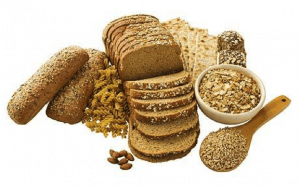
Have you heard the term “ancient grains”, or maybe even seen it on a restaurant menu? Why would you want to eat something that is ancient, that doesn’t sound appealing!
There is no official definition of ‘ancient grains.’ All whole grains in the larger sense are “ancient” — they all can trace their roots back to the beginnings of time, and are largely unchanged over the last several hundred years. These ancient seeds and cereals pack plenty of nutrition, especially in terms of fiber, protein, complex carbohydrates, vitamins, and minerals— all of which can benefit health.
Modern wheat (constantly bred and changed) is not an ancient grain, while einkorn, emmer/farro, Kamut®, and spelt would be considered ancient grains in the wheat family. Heirloom varieties of other common grains such as black barley, red and black rice, and blue corn might also be considered ancient grains. Other grains largely ignored until recently (such as sorghum, teff, millet, quinoa, amaranth) would also be widely considered to be ancient grains. Sometimes less common grains, like buckwheat, or wild rice, are also included. You may be starting to see wild rice on restaurant menus and store shelves, and maybe have even heard about buckwheat pancakes!
Ancient grains are certainly more nutritious than refined grain products (think white bread or white pasta). But ancient grains are not the only healthy whole grains. Common foods like brown rice, whole grain pasta, oatmeal, popcorn, and whole wheat bread offer the same whole grain goodness, and often are easier to find and typically easier on the wallet!
The best way to ensure that you’re getting the full spectrum of nutrients available in nature is to eat a variety of different grain foods. Ancient grains are versatile—deliciously complementing almost any dish from pancakes and porridge to pasta and polenta. Each whole grain has something different to offer (such as the calcium in teff and the soluble fiber in barley), making it impossible choose the best one.
When searching for a whole grain at the store, read the nutrition facts label before you buy. Read the ingredient list and make sure the first ingredient reads “whole grain ______”. Health benefits of whole grains are not limited to just wheat, they are included with any whole grain such as “whole grain rye”, “whole grain corn”, or “whole spelt”, etc., that you may see on a food’s ingredients list. If a whole grain is listed further down on the ingredients list, the food may not be a good source of whole grains.
Unsure if you are ready to take on the challenge of preparing ancient grains at home? Why don’t you try some when you are dining out, let the professionals prepare it for you! Many places in the Triangle have ancient grains on the menu, including Panera, Chopt, First Watch, B. Good, and Zoe’s Kitchen.
If you are ready to prepare an ancient grain at home and are looking for some ideas, try the Whole Grains Council website (https://wholegrainscouncil.org/recipes) for some recipes to get you started.
Is popcorn something you enjoy? Sorghum is a grain that can be popped just like corn, into a snack that is similar to popcorn! Bob’s Red Mill brand offers a recipe and video about how to make popped sorghum.
If you follow the recipe for popped sorghum as indicated on the website and video, a ¼ cup serving of sorghum grain would be: 158 calories, 5.1 grams protein, 1.7 grams fat, 34.6 grams carbohydrate. What a unique, healthy snack!
References:
https://wholegrainscouncil.org/whole-grains-101/whats-whole-grain/ancient-grains. Accessed 9/11/18.
https://foodandnutrition.org/blogs/stone-soup/ancient-grains-mean-health/. Accessed 9/12/18.
https://www.washington.edu/wholeu/2017/02/08/since-way-back-ancient-grains-are-a-heart-healthy-alternative/. Accessed 9/12/18.
https://www.bobsredmill.com/blog/recipes/meatless-mondays-popped-sorghum/. Accessed 9/12/18.




